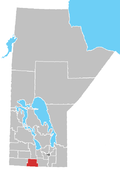Swan Lake First Nation
Appearance
(Redirected from Swan Lake 7)
| People | Saulteaux |
|---|---|
| Treaty | Treaty 1 |
| Land[1] | |
| Main reserve | Swan Lake 7 |
| Other reserve(s) | Indian Reserves 7A, 8, and 8A
|
| Land area | 65.40 km2 |
| Population (2021)[1] | |
| On reserve | 408 |
| Off reserve | 1053 |
| Total population | 1461 |
| Government[1] | |
| Chief | Jason Daniels |
| Council | Michael Esquash, Francine Meeches, Sean D. McKinney and Craig Soldier
|
| Website | |
| swanlakefirstnation | |
The Swan Lake First Nation (Ojibwe: Gaa-biskigamaag,[2] meaning The lake that is curved) is a Saulteaux band government located along Swan Lake in the Pembina Valley Region of Manitoba, Canada.
Its main reserve is Swan Lake 7, which is surrounded by the Municipality of Lorne; the First Nation also has economic initiatives located at their reserve nearby the Rural Municipality of Headingley (IR 8A).
Reserve lands
[edit]Swan Lake 7 | |
|---|---|
 | |
| Coordinates: 49°23′09″N 98°57′18″W / 49.3858131°N 98.9550057°W | |
| Area | |
| • Land | 27.72 km2 (10.70 sq mi) |
| Population (2016)[3] | |
• Total | 347 |
Swan Lake First Nation divided into 4 reserve lands:[1]
- Swan Lake 7 (IR 7) — surrounded by the Municipality of Lorne (Swan Lake); totalling 36.35 km2 (8,982 acres) in size, this is the First Nation's main reserve
- Forest Hills (IR 7a) — located by Carberry; totalling 26.36 km2 (6,514 acres) in size, it consists of residential and commercial developments
- Indian Gardens (IR 8) — located by Rathwell; totalling 2.6 km2 (640 acres) in size, most (75%) of this land is under agricultural lease
- Headingley (IR 8a) — located by the RM of Headingley; totalling 100,000 m2 (25 acres) in size, this location is planned to consist of mainly commercial developments
External links
[edit]- Map of Swan Lake 7 at Statcan Archived 2013-07-02 at the Wayback Machine[4]
References
[edit]- ^ a b "About Swan Lake First Nation – Swan Lake First Nation".
- ^ Andy Thomas Thomas, Florence Paynter. The Significance of Creating First Nation Traditional Names Maps. Manitoba First Nations Education Resource Centre Inc. https://mfnerc.org/wp-content/uploads/2015/05/The-Significance-of-Creating-First-Nation-Traditional-Names-Maps.pdf Archived 2022-10-20 at the Wayback Machine
- ^ "Census Profile, 2016 Census, Statistics Canada - Validation Error".
- ^ Statistics Canada (2012), 2011 Census. Statistics Canada Catalogue no. 92-142-XWE, Ottawa, Ontario (published October 24, 2012), archived from the original on July 2, 2013, retrieved February 16, 2017
{{citation}}: CS1 maint: location missing publisher (link)
- Swan Lake Development | Developing the comminity, archived from the original on May 22, 2016, retrieved February 15, 2017
- Swan Lake First Nation - Band History[dead link]

